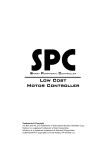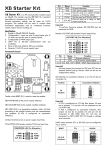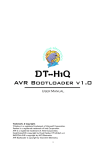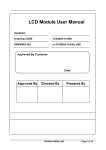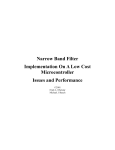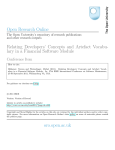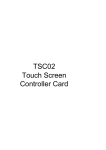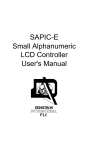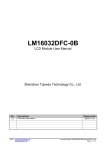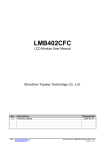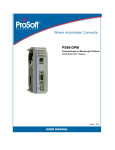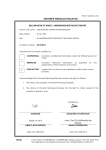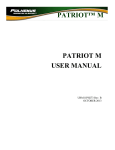Download Low Cost Serial LCD/OLED
Transcript
Smart Peripheral Controller Low Cost Serial LCD/OLED Trademarks & Copyright AT, IBM, and PC are trademarks of International Business Machines Corp. Pentium is a registered trademark of Intel Corporation. Hyper Terminal is copyright by Hilgraeve Inc. CodeVisionAVR is copyright by Pavel Haiduc, HP InfoTech s.r.l. Table of Contents 1 Introduction............................................................................................... 1.1. Specification................................................................................................ 1.2. SPC LOW COST SERIAL LCD/OLED Variant DDRAM Address........ 1.3. Suggested System...................................................................................... 3 3 3 3 2 Hardware.................................................................................................. 2.1. Component Layout..................................................................................... 2.2. Connector and Jumper Settings.............................................................. 4 4 4 3 Interface.................................................................................................... 3.1 UART Interface............................................................................................ 3.2 Command Set.............................................................................................. 3.2.1 Set LCD Control.......................................................................................... 3.2.2 Locate........................................................................................................... 3.2.3 Write Data.................................................................................................. 3.2.4 Read Address/Data.................................................................................. 3.2.5 Clear LCD.................................................................................................... 3.2.6 Change Line................................................................................................. 3.2.7 Text Slot....................................................................................................... 3.2.8 LCD/Buzzer Setting................................................................................... 5 5 6 6 7 7 8 8 9 9 10 4 Testing Procedure..................................................................................... 10 5 Application and Program Examples......................................................... 11 Attachment A. SPC LOW COST SERIAL LCD/OLED Schematics................................. 2 12 1. INTRODUCTION Smart Peripheral Controller (SPC) LOW COST SERIAL LCD is a CHARACTER LCD/OLED controller module that supports UART interface level TTL and RS232 line so that it can save and ease the cable works. Application examples from SPC LOW COST SERIAL LCD/OLED are character monitor, display, counter display, time display, etc. 1.1 SPECIFICATION SPC LOW COST SERIAL LCD/OLED specification are as follows: • Requires power supply: 6.5 – 12 Volts. • Equipped with 3.3 Volts or 5 Volts voltage regulator. • Equipped with UART TTL or RS-232 level. • Equipped with buzzer that can be controlled via UART • Turning backlight on/off via UART. • Compatible with up to 40x2 LCD Module that uses a HD44780 compatible driver. • Compatible with OLED module display. • LCD/OLED variants supported by SPC LOW COST SERIAL LCD/OLED: - LCD 8 x 2 , without backlight - LCD 16 x 2 , with backlight - LCD 20 x 2 , with backlight - LCD 20 x 2 Large , with backlight - LCD 20 x 4 , with backlight - LCD 24 x 2 , with backlight - LCD 40 x 2 , with backlight 1.2 SPC LOW COST SERIAL LCD/OLED VARIANT DDRAM ADDRESS 8x2 00H………….07H 40H………….47H 16 x 2 ………0FH ………4FH 20 x 2 ………13H ………53H 24 x 2 ………17H ………57H 40 x 2 ………27H ………67H 20 x 4 00H………….………………………………13H 40H………….………………………………53H 14H………….………………………………27H 54H………….………………………………67H 1.3. SUGGESTED SYSTEM Suggested system for SPC LOW COST SERIAL LCD/OLED: Hardware: • PC™ AT™ Pentium® IBM™ Compatible. • DVD-ROM Drive and Hard disk. Software: • The files found in the CD/DVD program: Datasheet, contoh_uart.c, and SPC LOW COST SERIAL LCD/OLED Manual. 3 2. HARDWARE 2.1. COMPONENT LAYOUT 2.2. CONNECTOR AND JUMPER SETTINGS VIN (J1) connector is a connector for module power supply. Power supply input will be connected with voltage regulator. Connector Pin Name Function 1 GND Ground reference for power supply input 2 6.5-12VDC Connected to power supply (6.5 – 12 VDC) J1 REG SLCT (J2) jumper is used to select the output voltage from the voltage regulator on the SPC LOW COST SERIAL LCD/OLED. REG SLCT (J2) Jumper Output Voltage Value 3.3 VDC (jumper attached) 5 VDC (jumper released) LED PWR (D4) is the power supply input LED indicator. Variable Resistor R16 can be turned to adjust the LCD contrast. UART RS232 (J4) RJ11 connector is a connector for UART RS-232 Interface. Pin 2 3 4 5 Name NC COM TX RX Function Not connected Ground reference Data output line Data input line J4 Front view 5 4 3 2 RX GND TX 4 UART TTL (J8) connector is a connector for UART TTL Interface. Pin 1 2 3 Name GND TX-TTL RX-TTL Function Ground reference Data output line Data input line RX-JMP (J6) and TX-JMP (J7) jumpers are used to select UART interface voltage level used by SPC LOW COST SERIAL LCD/OLED. RX-JMP and TX-JMP jumpers UART Level Voltage 3 2 1 J7 J6 UART TTL 3 2 1 J7 J6 UART RS-232 LCD PORT (J5) connector a connector to connect SPC module with LCD/OLED module. Pin 1 2 3 4 5 6 7 8 9 10 11 12 13 14 15 16 Name DGND VCC VR RS R/W E D0 D1 D2 D3 D4 D5 D6 D7 VCC BLK Function Ground reference Output voltage (3.3V or 5V) for LCD/OLED module LCD contrast adjuster Register Select Read/Write Selector Start data read/write Data pin 0 Data pin 1 Data pin 2 Data pin 3 Data pin 4 Data pin 5 Data pin 6 Data pin 7 Output voltage (3.3V or 5V) for LCD backlight Ground reference for LCD backlight 3. INTERFACE SPC LOW COST SERIAL LCD/OLED has the UART TTL and UART RS232 interfaces which can be used to receive or send data. 3.1. UART Interface UART communication parameters are as follows: • 38400 bps • No parity bit • 8 bit data • No flow control • 1 stop bit 5 Each data that enters via UART will be displayed on the LCD/OLED screen according to the Character Generator ROM pattern table on the LCD/OLED manual, except for command character and its parameters. All of the command sent via UART interface begin with 1 byte data that contains <command>, followed by (if needed) n-byte command parameter data. If the command sent is a command requesting data from the SPC LOW COST SERIAL LCD/OLED module, then the SPC LOW COST SERIAL LCD/OLED will send the data via TX line. Sending/reading a data parameter/response larger than 255 is sent in two phases. One byte MSB data is sent/read first and then followed by LSB data. Available commands and parameters can be seen in section 3.2. 3.2. COMMAND SET The following is the complete list of commands on the UART Interface. 3.2.1. SET LCD CONTROL Function Control the LCD/OLED function Command 0x08 Parameter < control > contains 1 byte data control to control the LCD/OLED display, with the following bits configuration: MSB BL LSB D/C L R Dir Dis Cur Blk The function of each bit: BL = 1 : Backlight On (default) BL = 0 : Backlight Off D/C = 1 : Display Shift D/C = 0 : Cursor Shift (default) L R = 00 : No Display Shift (default) L R = 01 : Display Shift to Right L R = 10 : Display Shift to Left L R = 11 : No Display Shift Dir = 1 : Cursor Increment (default) Dir = 0 : Cursor Decrement Dis = 1 : Display On (default) Dis = 0 : Display Off Cur = 1 : Cursor On (default) Cur = 0 : Cursor Off Response Description Blk = 1 : Blink On (default) Blk = 0 : Blink Off ● When the SPC module is turned on, reset, or after the LCD Setting command, the control will be on default position. Example to turn on the backlight, display, cursor, blinking, and cursor increment direction (to the right) and no display/cursor shift, then the control has a value of 0x8F. 6 User : 3.2.2. LOCATE Function Command Parameter 0x08 0x8F Adjusts the cursor position on the screen, DDRAM, or CGRAM 0x09 < type > parameter type can be filled with: 1 = Locate LCD (to adjust cursor position on the LCD/OLED screen) 2 = Locate DDRAM (to adjust cursor position on the DDRAM) 3 = Locate CGRAM (to adjust cursor position on the CGRAM) < column > parameter column can be filled with desired column position (the leftmost position is the 0th column) for Locate LCD or can be filled with desired DDRAM/CGRAM address for Locate DDRAM/Locate CGRAM < line > parameter line can be filled with desired line position (the uppermost position are the 0th line) for Locate LCD or must be filled with 0 for Locate DDRAM/Locate CGRAM ● To find the allowed DDRAM and CGRAM addresses, can be seen in HD44780 datasheet or the LCD/OLED datasheet. Response Description Example to adjust the cursor position so that it is on the 5th column and 0th line, then after the Locate LCD command is sent, it is followed by column data with a value of "0x05" and line data with a value of "0x00". User 3.2.3. WRITE DATA Function Command Parameter : 0x09 0x01 0x05 0x00 Writes data to DDRAM or CGRAM 0x0A < type > parameter type can be filled with: 1 = Write Data to DDRAM (writes data into DDRAM according to the address pointed by DDRAM cursor) 2 = Write Data to CGRAM (writes data into CGRAM according to the address pointed by CGRAM cursor) Response Description < data > parameter data can be filled with 1 byte written data ● After the command is performed, then the DDRAM/CGRAM cursor position will be incremented automatically. 7 Example to make a new character, a degree symbol (°), and will be accessed via DDRAM address 0x00, then the first thing to do is to perform LOCATE CGRAM command to the 0x00 address. The next step is to save the degree symbol icon (°) on the specified CGRAM memory. For example the degree symbol (°) is made by the following data: 00000000 00001111 00001001 00001001 00001111 00000000 00000000 00000000 User : = = = = = = = = 0x00 0x0F 0x09 0x09 0x0F 0x00 0x00 0x00 0x09 0x03 0x00 0x00 // Locate CGRAM command 0x0A 0x02 0x00 0x0A 0x02 0x0F 0x0A 0x02 0x09 0x0A 0x02 0x09 0x0A 0x02 0x0F 0x0A 0x02 0x00 0x0A 0x02 0x00 0x0A 0x02 0x00 3.2.4. READ ADDRESS/DATA Function Reads the data/address on the DDRAM/CGRAM, reads the LCD/OLED type Command 0x0B Parameter < type > parameter type can be filled with: 1 = Read data from DDRAM (to read the data pointed by the DDRAM cursor) 2 = Read data from CGRAM (to read the data pointed by the CGRAM cursor) 3 = Read DDRAM address (to read the DDRAM cursor address) 4 = Read CGRAM address (to read the CGRAM cursor address) 5 = Read LCD type (to read the LCD/OLED type saved in the EEPROM) < result > contains the requested data or address - Response Description Example to find the DDRAM address of the current cursor position. User SPC 3.2.5. CLEAR LCD Function Command Parameter : : 0x0B 0x01 < result > Clears the LCD/OLED screen display 0x0C 8 Response Description ● When this command is sent, then the LCD/OLED display will be cleared and DDRAM cursor will return to 0x00 position. For example, clearing LCD/OLED display. User : 3.2.6. CHANGE LINE Function Command Parameter Response Description 0x0C Changes cursor line 0x0D ● When this command is sent, then the LCD/OLED cursor will move to the next line and column position will be in the 0th column. ● If the cursor is already on the bottommost line then the cursor will return to the 0th line. ● Make sure that the LCD/OLED type had been set to match the LCD/OLED used so that this command can function correctly. Example to change the LCD/OLED cursor position to the next line. User 3.2.7. TEXT SLOT Function Command Parameter : 0x0D Save/display a series of text 0x0E < type > parameter type can be filled with: 1 = Write data to slot (to save text on the slot) 2 = Read data from slot (to display the saved text on the LCD/OLED) < slotNum > parameter slotNum can be filled with byte data with a value of 0 up to 7 according to the number of the desired text slot Response Description < textData > parameter textData contains the saved text data ● Parameter textData is needed for "write data to slot" command. Whilst for "Read data from slot" command is not needed/must not be sent. ● A maximum of 8 text slots, each is able to store up to 16 characters, except for the 7th slot that has a 15 characters text length. ● For the 7th text slot, the 16th character is always filled with a space character. 9 ● ● ● The "Read data from slot" will display the texts starting on the current cursor position. When the text length saved in the slot is less than 16 characters, then the text data parameter can be added with "0x0E" (decimal unit 14) as the end of text mark. The text saved in the slot will be saved into EEPROM so it will not be erased when the SPC module is turned off. Example to save text "0 1 2 3 4 5 6 7 8 9" on the 0th text slot. User : 0x0E 0x01 0x00 0x30 0x20 0x31 0x20 0x32 0x20 0x33 0x34 0x35 0x36 0x20 0x37 0x38 0x39 Example to save text “ABCDE“ on the 1st text slot. User : 0x0E 0x01 0x01 0x41 0x42 0x43 0x44 0x45 0x0E Example to display text from the 1st text slot to LCD/OLED. User : 0x0E 0x02 0x01 3.2.8. LCD/BUZZER SETTING Function Determines LCD/OLED type and controls buzzer Command 0x0F Parameter < command > parameter command can be filled with: 0 = LCD 8 x 2 1 = LCD 16 x 2 (default) 2 = LCD 20 x 2 3 = LCD 20 x 2 Large 4 = LCD 20 x 4 5 = LCD 24 x 2 6 = LCD 40 x 2 7 = turns on buzzer 8 = turns off buzzer Response Description ● ● LCD/OLED type selection will be saved into EEPROM so it will not be erased when the SPC module is turned off. Buzzer selection will not be saved into EEPROM, so the buzzer will be turned off when the SPC module is turned, reset, or after LCD Setting command. Example to set SPC module to use LCD/OLED 16 x 2. User 4. : 0x3F 0x01 TESTING PROCEDURE 1. Connect LCD/OLED to SPC LOW COST SERIAL LCD/OLED module via LCD (J5) connector. 2. Adjust REG SLCT (J2) jumper so that it matched the LCD/OLED voltage (3,3 / 5 V). 3. Connect the 9 Volt power supply to SPC LOW COST SERIAL LCD/OLED module. 4. Power indicator LED will light up. 5. Buzzer will sound for about 200ms. 6. If the LCD is equipped with backlight, then the backlight will light up. 10 7. LCD/OLED cursor will appear and blink on the 0th line and column (upper left corner) which marks that the LCD/OLED initialization has succeeded. 8. When needed, adjust the VR LCD contrast adjuster so that the cursor display is clearly visible. 9. Connect SPC LOW COST SERIAL LCD/OLED to PC serial port via RJ11 connector (J4). 10. Set RX-JMP and TX-JMP (J6 and J7) jumpers so that it uses UART RS-232 level. 11. Run the serial communication software on the PC (for example: Hyper Terminal©) and adjust baudrate and other communication parameters so that it is compatible with SPC LOW COST SERIAL LCD/OLED module. 12. Type the characters that will be displayed on the LCD/OLED via the software. 5. APPLICATION AND PROGRAM EXAMPLES As an application example, DT-AVR Low Cost Micro System (LCMS) module is used as master for displaying message on the SPC LOW COST SERIAL LCD/OLED module with UART TTL interface. The following are the connections between modules: VIN (6,5V – 12V) SPC LOW COST SERIAL LCD/OLED TXTTL RX (PORTD.0) RXTTL TX (PORTD.1) DT-AVR LCMS COM (Ground) GND (Ground) As the program example as in the above application, there is contoh_uart.c in the included CD/DVD which is written using CodeVisionAVR© 2.03.9 evaluation. In the program, DT-AVR LCMS will send Clear LCD screen command, display "WELCOME" text, and sound the buzzer. After 2 seconds, the screen will be cleared again, Locate LCD command is sent before DT-AVR LCMS writes the message "Innovative" and "Electronics" consecutively while sounding the buzzer. After all of the messages have been sent, then the backlight will be blinked twice. ♦ Thank you for your confidence in using our products, if there are difficulties, questions, or suggestions regarding this product please contact our technical support: [email protected] 11 Attachment A. SPC LOW COST SERIAL LCD/OLED Schematics 12













